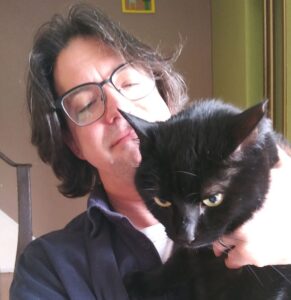Trigger Warning/Content Warning: This survivor story contains details that could be triggering, including domestic violence, rape/sexual assault, gaslighting, and mental health.
One Man’s Experience as a Survivor of Domestic Violence
Michael had been in a relationship with his ex-wife Kara (not her real name) since they were in high school. However, she did not become abusive until they were both in their 20s. “We never really left our adolescence – we had known each other for over half of our lives,” said Michael.

They hit some bumps in their marriage and there was anger on both sides. Michael said he was not blameless – he got angry and said unkind things, too. Michael and Kara saw a marriage counselor. Unfortunately, Michael learned first-hand why attending marriage counseling with an abuser is not recommended. This creates opportunities for abusers to exercise power and control. Kara lied to the marriage counselor, saying Michael was the abuser and Kara the victim. “She saw how her lies could control me and started gaslighting me into thinking I was the abusive person,” he said.
Michael experienced emotional, physical, and sexual violence at the hands of his ex-wife for more than 3 years. She would hurt him and tear him down and then a short while later, gaslight Michael and tell him that he was responsible for the abuse.
“There was also some self-coercion. I thought that maybe I could convince her to love me more and have her feel safe by encouraging her to hurt me. This is a really tough thing to realize after the fact. For a long time, I thought that made it my fault,” acknowledged Michael.
Michael said Kara was very skilled at subtle manipulation. The primary way she controlled him was to say that he was the abuser in the relationship. “No one had ever told me it was possible for a man to be abused,” he explained. “I recognized no red flags. I just thought I was in a bad relationship. I was raised that when there was a problem in a relationship, you work through it. But that was not the case. You cannot work through abuse.”
After three years of abuse, lies, and gaslighting, Kara decided she loved someone else and wanted to be in a polyamorous relationship with Michael and another man. “She insisted that I comply and accept the third person in the relationship. I insisted she decide between the two of us and she would not. So, that was the straw that broke the camel’s back. I left,” said Michael.
Although Michael was the one to leave Kara, he was unable to see that he made a good choice for himself. “For years, I couldn’t give myself the win. I insisted she left me. But really, I did leave her and I know that now,” he said.
Michael moved to a new city, mostly to get away from his ex-wife, but had little success with dating. “There was a time I would be upfront with people I wanted to date. I’d say ‘I have issues because of this thing that happened to me’ and they would run away,” expressed Michael.
A short time later, Michael met the woman who would become his now-wife. At first, everything was great. Then, one day, they had a bad sexual experience that caused Michael to break down. He went to a sex therapist who told him what he was truly experiencing was trauma. Then, he was referred to a psychiatrist who diagnosed him with post-traumatic stress disorder and prescribed him anti-depressants.

“But, the anti-depressants didn’t really work for me. I wasn’t clinically depressed – I was experiencing situational depression. Eventually, I found a trauma therapist, and that is what really helped me have a breakthrough,” he said.
He and his trauma therapist talked about his past and Michael joined a message board for people with PTSD. He says he learned a lot about domestic violence at that stage and he eventually began to accept that is what he experienced.
“I didn’t understand what happened to me for 15 years. I didn’t think of it as abuse or domestic violence for 15 years. I had already accepted I was emotionally abused, but I still didn’t think of that as domestic violence. I thought I couldn’t be abused because I am a man,” Michael pondered.
Michael said that back then, in the mid-2000s, there weren’t a lot of studies or papers on men as victims of domestic violence. The mental health field has made a lot of progress in the past decade and a half. Now, there are more messages about men as domestic violence victims in academia and the media, and this has given Michael some relief.
“I think the world is better now at understanding what can happen in any relationship – man, woman, straight, gay, trans – it can happen to anybody,” said Michael. But, he says that particular fears men can have may keep male survivors from coming forward.
“Men are worried about being perceived as gay, that they wanted it to happen, or that they are not really a man at all. These messages came not just from my dad and male peers, but they came from my mom, other women, people I had relationships with,” Michael declared.
Eventually, Michael came forward about his past and he was pleasantly surprised with his friends’ and family members’ reactions. “I disclosed to my friends and family that I had PTSD and everyone was so wonderful about it. There were no issues, but I was very careful with who I told. Then, several months later, I told them why I had PTSD, that my ex-wife was abusive to me. And still, they understood, loved me, and supported me. A lot of men don’t expect that kind of reaction,” told Michael.

Michael wishes that he had more context when he was younger and that he knew his relationship was not healthy. “My life would’ve been improved if I realized what was happening to me, reached out for help, and received services,” he said.
It is important to Michael for him to help lead other survivors to healing. He is enrolled in a Master’s level counseling program and has a goal to become a men’s trauma therapist.
“Getting triggered is a real thing. I have a responsibility to myself and my family to make sure I can deal with that. I’ve struggled with not wanting to get out of bed, with anger, with stress. I’m still here, I’m working it out,” said Michael. “It is my mission to help other men to get to this stage, too, where you have the tools and the skills to keep going.”
For Michael, finding a support system through his therapist, his family & friends, and especially other survivors has helped him to heal. “We’re all survivors and we need to be allies for each other.”
While Women’s Center & Shelter of Greater Pittsburgh serves clients of all gender identities and sexualities, including straight, cisgender men, Michael is not a client of any of our programs. We connected with Michael through a webinar. WC&S encourages all survivors to reach out for help.



